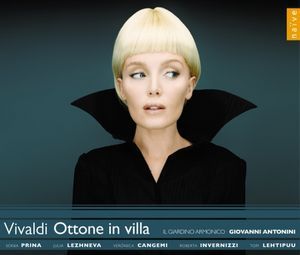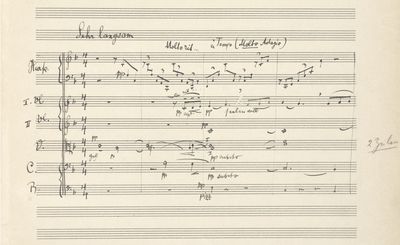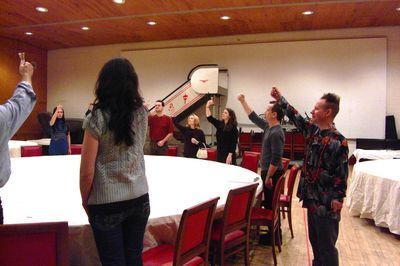Alex Ross's Blog, page 242
January 17, 2011
New Jersey Symphony in brief
January 16, 2011
Pop culture as elite culture
 A. O. Scott, film critic of the New York Times, has an intelligent piece on the age-old topic of "cultural elitism." He is responding to an article by Neal Gabler in which it is proposed that until the Internet allowed people to form their own opinions a dark conspiracy of "media executives, academics, elite tastemakers, and of course critics" forced innocent Americans to endure classical-music concerts, conceptual art shows, and other horrors. To be sure, it requires no great effort to knock down Gabler's thesis. What media executives have lately been foisting classical music on the masses? Please tell me — I'd like to send them a fruit basket. (David Sarnoff, pictured above, died in 1971.) Nonetheless, Scott's conclusion is worth quoting: "There is a cultural elite, in America, which tries its utmost to manipulate the habits and tastes of consumers. It consists of the corporations who sell nearly everything with the possible exception of classical music and conceptual arts, and while its methods include some of the publicity-driven hype that finds its way into newspapers, magazines and other traditional media, its main tool is not criticism but marketing." Indeed, Gabler has it completely upside down. No adult in all the land is being forced to go to a classical concert, yet the products of pop culture are imposed on the entire population round the clock. As I said at a Chamber Music America conference a few years ago, classical music is, in a strange way, the new underground.
A. O. Scott, film critic of the New York Times, has an intelligent piece on the age-old topic of "cultural elitism." He is responding to an article by Neal Gabler in which it is proposed that until the Internet allowed people to form their own opinions a dark conspiracy of "media executives, academics, elite tastemakers, and of course critics" forced innocent Americans to endure classical-music concerts, conceptual art shows, and other horrors. To be sure, it requires no great effort to knock down Gabler's thesis. What media executives have lately been foisting classical music on the masses? Please tell me — I'd like to send them a fruit basket. (David Sarnoff, pictured above, died in 1971.) Nonetheless, Scott's conclusion is worth quoting: "There is a cultural elite, in America, which tries its utmost to manipulate the habits and tastes of consumers. It consists of the corporations who sell nearly everything with the possible exception of classical music and conceptual arts, and while its methods include some of the publicity-driven hype that finds its way into newspapers, magazines and other traditional media, its main tool is not criticism but marketing." Indeed, Gabler has it completely upside down. No adult in all the land is being forced to go to a classical concert, yet the products of pop culture are imposed on the entire population round the clock. As I said at a Chamber Music America conference a few years ago, classical music is, in a strange way, the new underground.
January 15, 2011
CD of the week: Julia Lezhneva in Ottone
Leggi almeno, tiranna infedele
I was listening contentedly to Naïve's new recording of Vivaldi's Ottone in villa — the latest installment in the label's monumental Vivaldi Edition — when Julia Lezhneva's rendition of "Leggi almeno, tiranna infedele" sent me scurrying to the Internet for more information about the singer. Naïve's biography calls her "young"; she is, in fact, only twenty-one. You can listen to more excerpts from Ottone here, and also preview Lezhneva's new disc of Rossini arias. YouTube has a video of her singing "Gelosia," from Ottone. There are issues with breath control in some faster passages, but Lezhneva plainly has extraordinary potential as a Baroque and bel-canto singer. This Ottone is splendid all around, with Sonia Prina authoritative in the title role and Il Giardino Armonico providing characteristically vivid accompaniment.
January 13, 2011
Miscellany: Charles Jessold, etc.
The other day I mentioned the Obrecht Mass site, which allows you to hear the music, follow the score bar by bar, and read commentary. There are various online projects in this vein. Also worth investigating are Carnegie Hall's Performance Guides for the Schubert piano sonatas and the Bartók quartets, which mix video commentary (by Leon Fleisher and members of the Emerson Quartet) with animated scores.... William Steinway's Diary, a blow-by-blow account of musical life from 1861 to 1896, is now online.... Here's a behind-the scenes video for the accurately named innova label.... In a video interview for the Danish label dacapo, Per Nørgård talks about he perusaded György Ligeti to listen to the late-Romantic visionary Rued Langgaard. (Thanks to Eduardo Fernandez.) ... Connoisseurs of fictional composers will be glad to find that Charles Jessold, the murderous hero of Wesley Stace's eponymous novel, has his own website.... The Kaufman Center's Ecstatic Music Festival kicks off with a marathon on Jan. 17.... A sound investment: Carlos Kleiber's Tristan, Traviata, Freischütz, Fledermaus, Brahms 4, Beethoven 5 and 7, and Schubert for less than fifty dollars. But: no texts.... Best Music Writing 2011, which I'm co-editing with Daphne Carr, is accepting submissions. We're seeking the widest possible representation of genres and traditions.
January 10, 2011
Unlived memories
"After playing Chopin, I feel as if I had been weeping over sins that I had never committed, and mourning over tragedies that were not my own. Music always seems to me to produce that effect. It creates for one a past of which one has been ignorant, and fills one with a sense of sorrows that had been hidden from one's tears. I can fancy a man who had led a perfectly commonplace life, hearing by chance some curious piece of music, and suddenly discovering that his soul, without his being conscious of it, had passed through terrible experiences, and known fearful joys, or wild romantic loves, or great renunciations."
— Oscar Wilde, "The Critic as Artist"
January 7, 2011
Music at the Morgan
Image courtesy of the Morgan Library. Click to enlarge.
Just before Christmas, the Morgan Library unveiled digitized versions of some of the most important music manuscripts in its collection. Mozart's "Haffner" Symphony, Mahler's Fifth Symphony, and Schubert's Winterreise are among the dozens of treasures on offer. (The image above is of the first page of the Adagietto of Mahler's Fifth. Note that he writes "Molto Adagio.") The library says that in the near future more than nine hundred manuscripts will be made available. This is obviously a major resource for musicians, scholars, and music-lovers.
January 5, 2011
Cheers! Cheers! Cheers!
January 4, 2011
Polyphony online
In my column on Renaissance polyphony in this week's New Yorker, I mention in passing the Flemish group Capilla Flamenca. The delightful video above comes from their well-stocked website. Another group with a potent web presence is Cappella Pratensis, which not only has its own site but also participates in Jennifer Bloxam's remarkable multimedia study of Obrecht's Saint Donatian Mass. The latter allows you to follow along in the score and observe how the contrapuntal technique meshes with the religious texts. (Thanks to Matthew Westphal for the tips.) Blue Heron, the main focus of my piece, have their own richly informative site. They'll be back in NYC for a Victoria program on March 13. Pomerium, longtime New York mainstays, appear in the invaluable Music Before 1800 series on Feb. 13. And the Tallis Scholars remain the heavyweights of the polyphonic arena, offering highest-quality downloads through their in-house label, Gimell Records.
January 3, 2011
For Ann Southam
I neglected to mark here the death, in late November, of the Canadian composer Ann Southam, whose mesmerizing hour-long piano piece Simple Lines of Enquiry I picked as one of the highlights of the year 2009. (You can hear it at Other Minds radio.) Tamara Bernstein wrote a lovely obituary for the Globe and Mail. It doesn't appear online, so I thought I'd quote the opening lines: "Less than forty-eight hours before she lost a long battle with lung cancer, the composer Ann Southam sat listening to a radio station as it broadcast the well-known Humming Chorus from Puccini's opera Madama Butterfly. 'Imagine being at the first performance of that!' she exclaimed to a friend. 'What did people think of it?'" Elsewhere in the piece, Bernstein observes the intricate balance of consonant and dissonant elements in Southam's music—a balance that achieves sublime repose in Simple Lines—and quotes her saying, "Isn't that life, in a way: trying to accommodate dissonance?"
Blue Heron and Renaissance polyphony
Many Voices. The New Yorker, Jan. 10, 2011 (subscribers only).
Alex Ross's Blog
- Alex Ross's profile
- 425 followers








